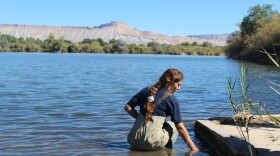-
To limit damage Colorado Parks and Wildlife has been increasing its efforts to detect the bivalve since it was first discovered in the state in 2022.
-
Zebra mussels originally came to North America through shipping vessels traveling in the St. Lawrence Seaway from Eastern Europe. In the Great Lakes region, they've wreaked havoc on water infrastructure, and caused millions of dollars in damage.
-
The Catch Up is your weekly way to get all the headlines and stories from KUNC in one place.
-
Adult zebra mussels were recently discovered in the Colorado River and a nearby lake in Grand Junction on the Western Slope. Wildlife officials have officials designated that area of the Colorado River as “infested.” Shannon Mullane is a reporter for the Colorado Sun . She discussed zebra mussels with KUNC's Desmond O'Boyle
-
Zebra mussels are invasive in the state of Colorado. Wildlife officials are working to keep them out.
-
Zebra mussel larvae were recently detected in the Colorado River. What does that mean for the 40 million people who depend on the river for drinking water and agriculture in Western states? And what can the state do about it?
-
The Catch Up is your weekly way to get all the headlines and stories from KUNC in one place.
-
Inspectors at Lake Tahoe recently discovered a new aquatic invasive species on a boat before it launched, sparking regional concerns. Officials say the incident serves as a reminder that people across the Mountain West should be on alert.
-
New cleaning stations in key areas of the state aim to remove the risk of aquatic nuisance species. This includes invasive mussels that can heavily damage ecosystems in lakes and reservoirs.
-
Invasive species are among the biggest drivers of biodiversity losses around the world. They’re also increasingly affecting tribal lands, and climate change is making it worse.

Play Live Radio
Next Up:
0:00
0:00
Available On Air Stations










